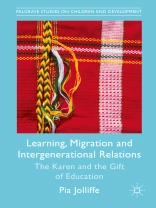Focusing on the Karen people in Burma, Thailand and the United Kingdom, this book analyses how global, regional and local developments affect patterns of learning. It combines historical and ethnographic research to explore the mutual shaping of intergenerational relations and children’s practical and formal learning within a context of migration and socio-political change. In this endeavour, Pia Jolliffe discusses traditional patterns of socio-cultural learning within Karen communities as well as the role of Christian missionaries in introducing schooling to the Karen in Burma and in Thailand. This is followed by an analysis of children’s migration for education in northern Thailand where state schools often encourage students’ aspirations towards upward social mobility at the same time as schools reproduce social inequality between the rural Karen and urban Thai society. The author draws attention to international humanitarian agencies who deliver education to refugees and migrants at the Thai-Burma border, as well as the role of UK government schools in the process of resettling Karen refugees. In this way, the book analyses the connections between learning, migration and intergenerational relations in households, schools and other institutions at the local, regional and global level.
Jadual kandungan
Forward: Integrative Learning and the Karen Diaspora (by Barbara R. Waters)-. Chapter 1: Introduction-. Chapter 2: Socio-cultural learning and work in the family-. Chapter 3: The value of schooling-. Chapter 4: Schools as sites of inclusion and marginalization-. Chapter 5: Migration for education and social inequality-. Chapter 6: Education and displacement at the Thai-Burma border-. Chapter 7: Learning and Integration in the United Kingdom-. Conclusion
Mengenai Pengarang
Dr Pia Jolliffe is a member of the Las Casas Institute as a research scholar of Blackfriars Hall, University of Oxford. She is also Research Fellow at the Oxford Institute of Population Ageing. Her publications focus on life transitions and aspirations within a context of migration and international development, refugees as well as the role of prisons and forced labour during the colonization of Japan´s northern island Hokkaido.












